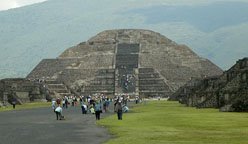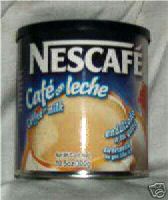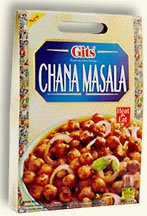Third World Convenience Foods
Nota bene: I know the term "third world" is politically incorrect. However, neither "underdeveloped" nor "periphery" really captures either the meaning or the intent that I have in this post. While we're at it, "God's little blind spot" is difficult to prove and is, maybe, a tiny bit offensive.
 When I was in sixth grade, my dad took my mom and I to a conference in Mexico City. Before we even got off the plane, we were heavily cautioned to avoid drinking tap water, eating street food, and generally doing anything that would bring us into contact with intestinal parasites. My father and I, of course, ignored this totally, while my mother was extremely careful. The upshot was that my mom ended up with a nasty case of the Quetzocoatl Two-step (we got tired of the phrase "Montazuma's Revenge" and experimented with our own terms). My father came out unscathed, and I had one terrible morning that I attributed to my first-ever hangover. God bless sangria!
When I was in sixth grade, my dad took my mom and I to a conference in Mexico City. Before we even got off the plane, we were heavily cautioned to avoid drinking tap water, eating street food, and generally doing anything that would bring us into contact with intestinal parasites. My father and I, of course, ignored this totally, while my mother was extremely careful. The upshot was that my mom ended up with a nasty case of the Quetzocoatl Two-step (we got tired of the phrase "Montazuma's Revenge" and experimented with our own terms). My father came out unscathed, and I had one terrible morning that I attributed to my first-ever hangover. God bless sangria!
The point here is that, when I was a kid, we took it for granted that American food was better tasting and better for the body than food produced in "underdeveloped" countries. We stood at the pinnacle of food technology and our sterilization procedures were top rate; they, on the other hand, brushed their teeth in slit-trench sewers and were known to eat cats and dogs. Clearly, God was on our side.
Flash forward twenty years, and I now find myself scouring Southwest Virginia in the search for third-world convenience foods. For example, my current caffeine-laden breakfast drink of choice is Nescafe Cafe con Leche, produced in--you guessed it--Mexico. Why do I love Nescafe Cafe con Leche? Well, I can tell you in three words: milk, sugar, coffee. These three ingredients comprise over 98% of my favorite breakfast drink. The three other ingredients, soy lecithin, sodium phosphate, and sodium citrate, are, at least according to Wikipedia, not harmful to me. The same cannot be said of high-fructose corn syrup (HFCS) and partially hydrogenated oils, which, along with sodium caseinate, comprise the top ingredients in most American-made breakfast beverages.
Southwest Virginia in the search for third-world convenience foods. For example, my current caffeine-laden breakfast drink of choice is Nescafe Cafe con Leche, produced in--you guessed it--Mexico. Why do I love Nescafe Cafe con Leche? Well, I can tell you in three words: milk, sugar, coffee. These three ingredients comprise over 98% of my favorite breakfast drink. The three other ingredients, soy lecithin, sodium phosphate, and sodium citrate, are, at least according to Wikipedia, not harmful to me. The same cannot be said of high-fructose corn syrup (HFCS) and partially hydrogenated oils, which, along with sodium caseinate, comprise the top ingredients in most American-made breakfast beverages.
How about foods? Well, the ingredients in MTR's Paneer Makhani, one of my favorite Indian-made convenience foods, are tomato, water, onion, cottage cheese, sunflower oil, butter, ginger, cashews, salt, clarified butter, garlic, coriander, sugar, red chilis, cumin, turmeric, copra, green chilis, cinnamon, cardamom, bay leaves, and cloves. The only thing I didn't immediately recognize was copra, but I just looked it up. It's dried coconut meat. There aren't any artificial additives, petroleum-based preservatives, heart-attack causing oils, or other assorted poisons. The same is true of GITS Indian meals, as well as the malaysian sodas I buy, the thai popsicles I've gotten addicted to, and the weird Hong Kong beef jerky that the international market carries. (Don't tell me that the Chinese eat cats and rats and dogs. I don't give a shit. As long as they lay off the high fructose corn syrup, I don't care if I'm munching on Rin-Tin-Tin. La la la, I can't hear you...)
 Don't get me wrong--I love junk food. I love grease, fat, oil, lard, butter, meat, and all the other natural ingredients that are sure to kill me. I just have a problem with the man-made ingredients that make my food taste like baboon ass. For example, I love honey and sugar, but despise high fructose corn syrup because it tastes like shit, causes diabetes, and is slowly being sneaked into pretty much every food on the face of the earth. Ditto partially hydrated oils, which cause heart disease. Call me shortsighted, but I don't mind if my food is bad for my body, as long as it tastes good and isn't a poison.
Don't get me wrong--I love junk food. I love grease, fat, oil, lard, butter, meat, and all the other natural ingredients that are sure to kill me. I just have a problem with the man-made ingredients that make my food taste like baboon ass. For example, I love honey and sugar, but despise high fructose corn syrup because it tastes like shit, causes diabetes, and is slowly being sneaked into pretty much every food on the face of the earth. Ditto partially hydrated oils, which cause heart disease. Call me shortsighted, but I don't mind if my food is bad for my body, as long as it tastes good and isn't a poison.
Why does America use so many artificial ingredients? There are two reasons, actually: convenience and cost. Apparently, artificial sweeteners and chemicals are cheaper than natural ingredients. This, however, doesn't really explain why all the products that I've mentioned cost the same or less than their American competitors. Perhaps American avacados are unionized?
I think that the real culprit is convenience. Foods that are produced with the assistance of a chemistry set tend to last forever, while natural ones go bad. The mexican guacamole I buy, for example, needs to be eaten or frozen within two weeks of purchase, while my Indian convenience foods have to be consumed within a year or two of purchase.
Now, I don't live in a cabin in Montana, so I am, admittedly, a little unclear on the whole "eternal food" idea. Why, exactly, does my food need to have an expiration date that is years past my own? More to the point, why does America, with one of the greatest transportation infrastructures in the world, need to include so many preservatives, while Mexico doesn't? Seriously, one of my friends who visits Mexico regularly has told me that there are places where burros are still the primary freight carrier. Yet, somehow, Mexico doesn't need a huge list of preservatives to make sure that its food is fresh. Ditto India, Malaysia, Thailand, Vietnam...France, Italy, England, Germany...and all the other countries that restrict the use of these food additives.
I guess they're just uncivilized; maybe when they're ready to join the modern world they'll embrace high fructose corn syrup. In the meantime, I'll be shopping at the international market.
 When I was in sixth grade, my dad took my mom and I to a conference in Mexico City. Before we even got off the plane, we were heavily cautioned to avoid drinking tap water, eating street food, and generally doing anything that would bring us into contact with intestinal parasites. My father and I, of course, ignored this totally, while my mother was extremely careful. The upshot was that my mom ended up with a nasty case of the Quetzocoatl Two-step (we got tired of the phrase "Montazuma's Revenge" and experimented with our own terms). My father came out unscathed, and I had one terrible morning that I attributed to my first-ever hangover. God bless sangria!
When I was in sixth grade, my dad took my mom and I to a conference in Mexico City. Before we even got off the plane, we were heavily cautioned to avoid drinking tap water, eating street food, and generally doing anything that would bring us into contact with intestinal parasites. My father and I, of course, ignored this totally, while my mother was extremely careful. The upshot was that my mom ended up with a nasty case of the Quetzocoatl Two-step (we got tired of the phrase "Montazuma's Revenge" and experimented with our own terms). My father came out unscathed, and I had one terrible morning that I attributed to my first-ever hangover. God bless sangria!The point here is that, when I was a kid, we took it for granted that American food was better tasting and better for the body than food produced in "underdeveloped" countries. We stood at the pinnacle of food technology and our sterilization procedures were top rate; they, on the other hand, brushed their teeth in slit-trench sewers and were known to eat cats and dogs. Clearly, God was on our side.
Flash forward twenty years, and I now find myself scouring
 Southwest Virginia in the search for third-world convenience foods. For example, my current caffeine-laden breakfast drink of choice is Nescafe Cafe con Leche, produced in--you guessed it--Mexico. Why do I love Nescafe Cafe con Leche? Well, I can tell you in three words: milk, sugar, coffee. These three ingredients comprise over 98% of my favorite breakfast drink. The three other ingredients, soy lecithin, sodium phosphate, and sodium citrate, are, at least according to Wikipedia, not harmful to me. The same cannot be said of high-fructose corn syrup (HFCS) and partially hydrogenated oils, which, along with sodium caseinate, comprise the top ingredients in most American-made breakfast beverages.
Southwest Virginia in the search for third-world convenience foods. For example, my current caffeine-laden breakfast drink of choice is Nescafe Cafe con Leche, produced in--you guessed it--Mexico. Why do I love Nescafe Cafe con Leche? Well, I can tell you in three words: milk, sugar, coffee. These three ingredients comprise over 98% of my favorite breakfast drink. The three other ingredients, soy lecithin, sodium phosphate, and sodium citrate, are, at least according to Wikipedia, not harmful to me. The same cannot be said of high-fructose corn syrup (HFCS) and partially hydrogenated oils, which, along with sodium caseinate, comprise the top ingredients in most American-made breakfast beverages.How about foods? Well, the ingredients in MTR's Paneer Makhani, one of my favorite Indian-made convenience foods, are tomato, water, onion, cottage cheese, sunflower oil, butter, ginger, cashews, salt, clarified butter, garlic, coriander, sugar, red chilis, cumin, turmeric, copra, green chilis, cinnamon, cardamom, bay leaves, and cloves. The only thing I didn't immediately recognize was copra, but I just looked it up. It's dried coconut meat. There aren't any artificial additives, petroleum-based preservatives, heart-attack causing oils, or other assorted poisons. The same is true of GITS Indian meals, as well as the malaysian sodas I buy, the thai popsicles I've gotten addicted to, and the weird Hong Kong beef jerky that the international market carries. (Don't tell me that the Chinese eat cats and rats and dogs. I don't give a shit. As long as they lay off the high fructose corn syrup, I don't care if I'm munching on Rin-Tin-Tin. La la la, I can't hear you...)
 Don't get me wrong--I love junk food. I love grease, fat, oil, lard, butter, meat, and all the other natural ingredients that are sure to kill me. I just have a problem with the man-made ingredients that make my food taste like baboon ass. For example, I love honey and sugar, but despise high fructose corn syrup because it tastes like shit, causes diabetes, and is slowly being sneaked into pretty much every food on the face of the earth. Ditto partially hydrated oils, which cause heart disease. Call me shortsighted, but I don't mind if my food is bad for my body, as long as it tastes good and isn't a poison.
Don't get me wrong--I love junk food. I love grease, fat, oil, lard, butter, meat, and all the other natural ingredients that are sure to kill me. I just have a problem with the man-made ingredients that make my food taste like baboon ass. For example, I love honey and sugar, but despise high fructose corn syrup because it tastes like shit, causes diabetes, and is slowly being sneaked into pretty much every food on the face of the earth. Ditto partially hydrated oils, which cause heart disease. Call me shortsighted, but I don't mind if my food is bad for my body, as long as it tastes good and isn't a poison.Why does America use so many artificial ingredients? There are two reasons, actually: convenience and cost. Apparently, artificial sweeteners and chemicals are cheaper than natural ingredients. This, however, doesn't really explain why all the products that I've mentioned cost the same or less than their American competitors. Perhaps American avacados are unionized?
I think that the real culprit is convenience. Foods that are produced with the assistance of a chemistry set tend to last forever, while natural ones go bad. The mexican guacamole I buy, for example, needs to be eaten or frozen within two weeks of purchase, while my Indian convenience foods have to be consumed within a year or two of purchase.
Now, I don't live in a cabin in Montana, so I am, admittedly, a little unclear on the whole "eternal food" idea. Why, exactly, does my food need to have an expiration date that is years past my own? More to the point, why does America, with one of the greatest transportation infrastructures in the world, need to include so many preservatives, while Mexico doesn't? Seriously, one of my friends who visits Mexico regularly has told me that there are places where burros are still the primary freight carrier. Yet, somehow, Mexico doesn't need a huge list of preservatives to make sure that its food is fresh. Ditto India, Malaysia, Thailand, Vietnam...France, Italy, England, Germany...and all the other countries that restrict the use of these food additives.
I guess they're just uncivilized; maybe when they're ready to join the modern world they'll embrace high fructose corn syrup. In the meantime, I'll be shopping at the international market.








4 Comments:
This is a great post. I'm glad I followed the trail of bread crumbs (w/o partially hydrogenated fats) back here after you visited my blog.
I've bookmarked you so I can get back on my own next time.
By heartinsanfrancisco, At
October 19, 2006 at 8:03 PM
heartinsanfrancisco, At
October 19, 2006 at 8:03 PM
Thanks--I did the same. Your blog is painfully funny.
By Crankster, At
October 19, 2006 at 8:45 PM
Crankster, At
October 19, 2006 at 8:45 PM
I agree with Hearts of San Fran -- Great post! The interesting thing is that little by little, American products are infiltrating the 'third world.' If you go to a Mexican grocery store, you will find lots of American products on the shelves. Isn't it nice how we share all our unhealthy products with the 'less fortunate'? ;)
By Anonymous, At
October 21, 2006 at 3:06 PM
Anonymous, At
October 21, 2006 at 3:06 PM
This is how we take over the world...one obese rugrat at a time.
By Crankster, At
October 21, 2006 at 11:36 PM
Crankster, At
October 21, 2006 at 11:36 PM
Post a Comment
Subscribe to Post Comments [Atom]
<< Home